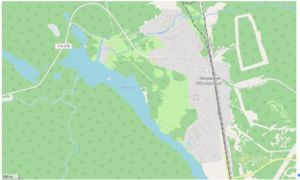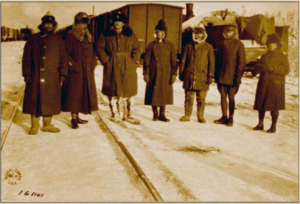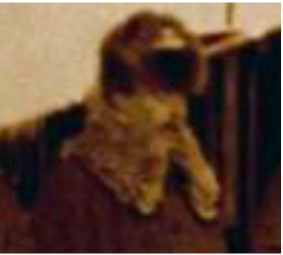Monthly Archives: November 2018
12th November 1918 Tuesday
News of the Armistice Trickles Through and Turner Teased
All material produced or reproduced here and throughout this work is the sole copyright of the author and the family of Doctor D.C.M. Page MC.
“We didn’t get news of the Armistice being signed till Tuesday 12th. The news came per the R.A.F. wireless, and I helped the R.A.F. mess to celebrate the occasion at night. Almost every officer at Obozerskaya was in the R.A.F. Mess that night. Major Turner* came in for a lot of teasing! He had his beard pulled, pins stuck into him, and water emptied down his neck! He was finally bundled out into the snow!”
News of the Armistice had yet to be confirmed with all ranks. On the 11th an American soldier Charles Brady** reported that a patrol from Obozerskaya had three men killed and several injured. Northern Russia would remain a very dangerous place for Allied troops to be in, for the foreseeable future. Brady states that they finally got a notice of Armistice on the 14th.
* Major Turner was the Roger Casement lookalike that requires further investigation by us. If anyone can help please let us know in the comments. From the way he was treated we wonder if he really was a major or whether this was a nickname.
** Diary, July 1918-March 1919 from the Charles Brady Ryan papers, 1916-1919 [Folder 2, Item 1]
Find out about our connection with Dr Page and an introduction to his diary here
11th November 1918 Monday
The Central Powers Defeated as Armistice is signed in France, but in Russia the Fighting Continues.
All material produced or reproduced here and throughout this work is the sole copyright of the author and the family of Doctor D.C.M. Page MC.
“On Monday 11th Nov. our planes had a busy day in spite of the disagreeable weather conditions. It was wet and very cold. Millar, the flight-commander, crashed at Verst 455 but wasn’t hurt, and somebody else dropped two bombs into the lake, which circumstance put the wind up everybody!”
On this day the guns on the Western Front and most other fronts ceased their relentless roar. The World had been plunged into a turmoil such as it had never before experienced. On July 28th 1914 a young Serbian student shot and killed Archduke Franz Ferdinand, heir apparent to the throne of the Austro-Hungarian Empire and his wife whilst on a visit to Sarajevo. The resulting domino effect saw most of Europe gradually sliding into an unstoppable nightmare that would last for four years and four months. Some skirmishes did continue in some of the remoter theatres of the war such as Mozambique and Palestine but the “war to end all wars” for most people ceased at 11am French time on the 11thNovember 1918.
Winston Churchill at this point in history was the British Minister for Munitions after having had a chequered record during the war, resigning after being heavily blamed for his role in the massacres in the Dardenelles. Gallipoli’s blood soaked beaches had seen the deaths of 250,000 troops and Churchill was forced to resign from Government in November 1915. Days later he took himself off to the trenches assuming the rank of Lt. Colonel and commanding the 6thBattalion Royal Scots Fusiliers. Although his unit was not involved in direct fighting at the time, Churchill himself visited the front line no less than 36 times, cheating death more than once. It was obvious that he was trying to expunge his reputation from the disasters of Turkey.
He returned to Parliament to more criticism. ‘You will one day discover that the state of mind revealed in (your) letter is the reason why you do not win trust even where you command admiration. In every line of it, national interests are completely overshadowed by your personal concern.’, was David Lloyd George’s assessment. Nevertheless, Churchill returned to Government in July 1917 as Minister of Munitions, but it was events taking place in Russia that would occupy his attention as it did through most of his life.
The Revolutions that took place in Russia from April 1917 and again in October that year brought fear of a destabilising situation. The communist Bolsheviks had seized power in Russia and fearing the spread of communism throughout war torn Europe Churchill felt he must do anything in his power to check its proliferation.
For the men sent to fight the cause against Bolshevism, they did not hear about the Armistice until the following day, during which time more casualties were sustained. They could have been forgiven for thinking that they would immediately lay down their arms at the news that the war had ended. From the high command downwards they waited expectantly for the order to return home. This order never came and the fight went on. Douglas and his comrades would remain in Russia to fight Churchill’s (and others’) undeclared war against communism. This was a war that many would ask, “Why are we here”? It was seen as an internal conflict. If Russians wanted a Bolshevik government then so what? That’s their business why should it bother us? Churchill took a wider view and by those who agreed with him managing to convince the United States to assist they would remain there for the months to come.
Find out about our connection with Dr Page and an introduction to his diary here
8th November 1918 Friday
Tour of Inspection
All material produced or reproduced here and throughout this work is the sole copyright of the author and the family of Doctor D.C.M. Page MC.
“On Friday, the 8th, I had a long day chasing around with Col. Carroll, the O.C., L. of C.,* and Major Turner, the Camp Commandant. We were accompanied by two other officers, and Sgt. Lofthouse, the new Sanitary Sergeant. We went via the aerodrome to the village of Malaturka on the lake in the heart of the forest about 2 miles from Obozerskaya. This lake is a lovely sheet of water – 3 miles long by about ½ mile broad – and the small village of about thirty houses lies on the north side. On the south side is a large fish-curing factory, where work has ceased since the Revolution. We crossed the lake on a raft, and selected sites for billets etc. for troops. We then walked across the fields to the Forestry Village, and then back to Obozerskaya. There was a railway smash up the line at night. The annexe train ran into another train, killing one man, and injuring two others.”
* O.C. Officer Commanding, L of C. Lines of Communication.
Colonel Jock Carroll an old campaigner recently in charge of a brigade in France and now posted by General Ironside to the Dwina front.

(c) OpenStreetMap contributors
Modern map showing the lake and Oberserskaya. There is no sign of the defunct fish factory these days, the southern shore is completely given over to forest right up to the shoreline.
Find out about our connection with Dr Page and an introduction to his diary here
6th November 1918 Wednesday
Hope for The End of The War in Europe?
All material produced or reproduced here and throughout this work is the sole copyright of the author and the family of Doctor D.C.M. Page MC.
“On Wednesday night, Nov. 6th, we heard per wireless that Turkey and Austria were out of the war, and that Germany was breaking. We were all greatly cheered up over this as we hope to get out of this hole as soon as Peace is signed). (What a hope we had!)”
After over 4 years of relentless fighting with millions dead all over the world but especially in Europe, protagonists were looking for an end. Russia on the side of the Allies had withdrawn in 1917, now Austria and Turkey had pulled out three days previoulsy. This was the break-up of the Central Powers with Austria the original perpetrators now giving in.
Germany although now with a population starving and demoralised was seeking a dignified withdrawal, but certainly not surrender. German politicians and senior military personnel were trying to negotiate a ceasefire, but on their own terms, but so far the allies were having none of it and an occupation of Germany was certainly on the cards.
Austria’s cessation of hostilities on November 3rdsparked the break-up of the Austro-Hungarian Empire and the centuries long Hapsburg dynasty domination of Europe came to an effective end. Turkey’s Ottoman Empire was also about to be broken up. It ceased in 1921/22 when Turkey entered into a new phase of its history eventually led by Mustapha Kemel as he re-organised Turkey into a modern republic that would begin new dialogue with the west.
Find out about our connection with Dr Page and an introduction to his diary here
5th November 1918 Tuesday
The Assistant Director Medical Services Drops In
All material produced or reproduced here and throughout this work is the sole copyright of the author and the family of Doctor D.C.M. Page MC.
“On the following day I had a surprise visit from the A.D.M.S. and Kennedy. They spent the day with me, and I showed them all the sights, including the Forestry Village. The A.D.M.S. did not approve of my idea of a hospital in the Forestry Village, as it was too far (1 mile) from the railway. He was disgusted with the sanitation of the place, and ticked off the camp commandant for not helping me to improve matters. The A.D.M.S. returned to Archangel at night, but Kennedy stayed on for a couple of days making notes of all the sanitary requirements.”
Colonel McDermott ADMS see 19th October entry
Captain Kennedy DADMS (Sanitation) attended Douglas’s old school George Watson’s College, Edinburgh.
Find out about our connection with Dr Page and an introduction to his diary here
4th November 1918 Monday
Enter Commandant Lucas
All material produced or reproduced here and throughout this work is the sole copyright of the author and the family of Doctor D.C.M. Page MC.
“On November 4thI had an interview with Col. Lucas, a French officer, who has command of the Force now. The same afternoon the Bolsheviks attacked us. They were seven hundred (700) strong, according to the American story, but were very easily repulsed. Our casualties were 1 man killed, and 2 wounded. The Bolos lost heavily. We took 10 prisoners and many were killed and wounded.”
The French Commandant Lucas was brought in by General Ironside on November 3rd to command the railway front following the refusal of the American Colonel Stewart to take on a combat role. This refusal had Ironside wondering how it was possible for any military man to refuse the chance of swapping an administrational command for that of a combative one. Lucas had no such hesitation and accepted immediately. He had much experience after lengthy commands in the French Colonial Service, choosing a Major Aarchen as his staff officer. He would convince his French troops that the Americans would not be able to fight without the French by their side, so boosting the fighting morale of his men.

Lucas is second from the left (c) https://www.archives.gov/

Find out about our connection with Dr Page and an introduction to his diary here
2nd November 1918 Saturday
Wily Monsters
All material produced or reproduced here and throughout this work is the sole copyright of the author and the family of Doctor D.C.M. Page MC.
“During the next day or two I was busy interviewing Colonels, Majors etc. and urging upon them the need for proper sanitation for the troops. It was a job getting them to make a move at all. On the 2ndNovember I ‘flitted’ into a room in the yellow house. The place had previously been occupied by American troops, and was crawling with bugs. I had the room sprayed with cresol, but this didn’t seem to have much effect on the wily monsters.”
Cresol was and is an organic compound that can be extracted from coal tar or can be produced synthetically. It was commonly found in creosote and is the source of the coal tarry smell associated with the now discredited creosote products for the damaging effects on health and the environment. The European Union has restricted its use and it is no longer available to preserve your wooden fences.
The list of side effects from inhaling, ingesting or applying high levels of cresols to the skin is warning enough not to go near them. These include skin burning and irritation, vomiting, damage to internal organs, facial paralysis, coma and even death. The long list of case reports on this website is scary reading too https://toxnet.nlm.nih.gov/cgi-bin/sis/search/a?dbs+hsdb:@term+@DOCNO+250
One might wonder what the longer term effects on the people exposed to the Cresol solution may have been. Sadly the bugs Douglas speaks about seemed impervious, at least in the short term, to it.
Find out about our connection with Dr Page and an introduction to his diary here